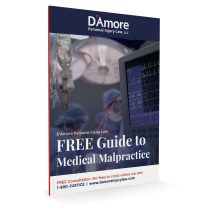D'Amore Personal Injury Law, LLC
Serious Injury Lawyers Proudly Serving
Baltimore, Annapolis, & Washington, D.C.
Delayed Diagnosis
Medical professionals — like everyone else — can make mistakes. We can’t expect perfection at all times. But we should expect a reasonable standard of care from our doctors when we step into hospitals.
When you visit a hospital, you expect your doctor to accurately diagnose and treat your health condition on time. Regrettably, this isn’t always the case. Some doctors may ignore the need to follow established medical procedures, risking catastrophic situations or even death.
Delayed diagnosis is a common diagnostic error in the medical field that can severely impact the lives of patients and their loved ones. If a delayed diagnosis worsens your condition, you may have legal grounds to file a delayed diagnosis lawsuit.
Clients Lives We've Helped Rebuild


What Is a Delayed Diagnosis?
The terms “delayed diagnosis” and “missed diagnosis” may seem similar, but they don’t share the same meaning in the medical discipline.
A delayed diagnosis refers to a situation where a doctor doesn’t diagnose a patient’s condition or disease within a reasonable amount of time. This implies that a physician eventually makes an accurate diagnosis of a patient’s condition, but that the diagnosis could have happened earlier.
In a delayed diagnosis case, the patient must have sought medical care from a doctor, but the latter didn’t discover the condition on time. This type of medical malpractice delays the treatment of the patient’s medical condition.
What Medical Mistakes May Lead to a Delayed Diagnosis?
A medical professional who fails to diagnose a condition risks irreparable harm to their patient. Here are some common mistakes a delayed diagnosis lawyer can use in a medical malpractice case:
- Overlooking symptoms or medical results
- Failing to refer a patient to a specialist
- Failing to order appropriate lab tests
- Disregarding a patient's medical history
- Misinterpreting test results
Learn about what to do after a Medical Malpractice Injury in our FREE guide.

When Is a Delayed Diagnosis Considered Medical Negligence?
Not every delayed diagnosis case constitutes medical malpractice. For example, if you visit a hospital and withhold information that can help to diagnose your disease, this isn’t considered an act of medical malpractice. As a patient, you should report everything, including symptoms, that you feel could help your doctor accurately diagnose your condition.
Similarly, a doctor cannot be held liable if a patient doesn’t seek medical treatment as soon as they feel unwell. In such cases, the patient shares the blame for delayed diagnosis since they didn’t seek medical care soon enough.
A delayed diagnosis case may involve complex litigation, requiring the skills and experience of a delayed diagnosis lawyer to prove negligence.
As a plaintiff, you must prove certain elements to win a delayed diagnosis medical malpractice claim:
- There was a doctor-patient relationship between you and the doctor
- The doctor's negligent actions breached accepted standards of care, leading to a significant delay in diagnosis
- You — the plaintiff — suffered harm due to the doctor's negligence
To establish medical negligence, a medical malpractice lawyer must demonstrate that the doctor failed to meet the standard of care that other qualified doctors would have provided under similar circumstances.
How Does Differential Diagnosis Work?
Typically, a doctor eliminates medical conditions they feel are inconsistent with the patient’s information and emergent symptoms. Eventually, a doctor is left with one possible diagnosis for a patient’s condition.
In a failure to diagnose case, any reputable delayed diagnosis attorney should consider whether the defendant could have prioritized their analysis to arrive at the right diagnosis much sooner. This often comes down to whether:
- The doctor included an accurate diagnosis in differential diagnosis, but they didn't distinguish it from the other conditions with similar signs and symptoms. Misinterpreting test results or failing to reach out to a specialist can result in this type of medical negligence.
- The doctor didn't include the correct condition relating to a patient's symptoms during their differential diagnosis. An experienced delayed diagnosis lawyer should prove that a different doctor wouldn't have failed to include and diagnose the medical condition in differential diagnosis under similar circumstances.
Is Expert Testimony Necessary in a Delayed Diagnosis Case?
Expert testimony is necessary in most medical malpractice cases involving delayed diagnoses. A competent medical expert in the same medical discipline may be required to testify how a reasonably skilled doctor would have acted if they were under the same circumstances. The expert will be required to show how a different doctor may have discovered the patient’s condition without significant delay.
For instance, a case may establish that a reasonable physician wouldn’t have missed a malignant tumor in a woman’s breast that led to a delayed diagnosis of cancer. In this case, the defendant can be sued for medical negligence that led to delay in treatment.
The patient may have to undergo chemotherapy and radiation treatment after cancer has spread simply because a doctor failed to order further tests or refer the patient to an oncologist. Early diagnosis could have made it possible to surgically remove the tumor, allowing the patient to make a full recovery.
Can a Medical Malpractice Lawyer Help Me?
If you have a severe medical condition, timely treatment can make all the difference. A delay in diagnosing your illness or injury can result in serious harm or even lead to death. If you are a victim of a delayed diagnosis, a medical malpractice lawyer can help you recover compensation for your injuries and damages, including medical bills and lost wages.
Don’t hesitate to contact the delayed diagnosis lawyers at D’Amore Personal Injury Law today for a free case review. Remember, you and your loved ones deserve prompt and accurate diagnoses from your doctors. Get started now to file your delayed diagnosis lawsuit.
FREE Case Consultation
Fill out the form below and we will contact you.
Or, give us a call at